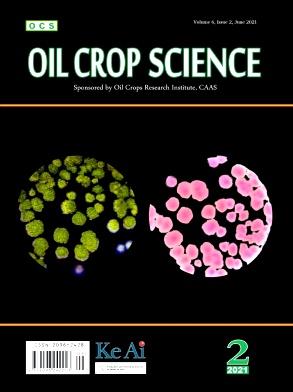花生幼苗上促进植物生长的根瘤菌:分离、分类和功能表征
Q3 Agricultural and Biological Sciences
引用次数: 0
摘要
为了提高作物产量,全球粮食生产需要可持续的农艺工具,如促进植物生长的根瘤菌(PGPR)。区域适应的PGPR菌株对提高花生产量至关重要。阿根廷是第七大花生生产国,Córdoba是主要种植区域,面积为25万公顷(占总播种面积的75%)。本研究旨在分离、鉴定和表征芽孢杆菌属和假单胞菌属的PGPR菌株的生物防治和促生长能力。对菌株进行了小菌核菌、罗氏菌核菌、黄曲霉、黄萎病镰刀菌的生防试验。为了促进生长,盆栽试验使用ASEM 400 INTA和Granoleico两种花生品种,在两种水分制度下,田间容量分别为40%和60%。分离到的菌株有:韦勒森芽孢杆菌、枯草芽孢杆菌、龙舌兰芽孢杆菌、萨福芽孢杆菌、高原芽孢杆菌和嗜冷假单胞菌。这些菌株在体外表现出溶磷、固氮、氨化、硝化、酶释放、植物激素生产和75%以上的高生物防治能力。SC6和RI3(均为白僵菌)和P10(嗜冷棘菌)表现优异。花生根系生物量显著提高50%以上,叶面积显著提高30%,叶绿素含量指数和叶片相对含水量显著提高,特别是在水分胁迫条件下(40%田间容量)。根据研究结果,RI3、SC6和P10可以归类为PGPR,这支持了在这些微生物的其他野外研究中得到的结果。今后的调查应优先发展工业配方,以评估其在替代作物中的有效性,并将其纳入其他农业实践。本文章由计算机程序翻译,如有差异,请以英文原文为准。

Plant growth-promoting rhizobacteria on peanut seedlings (Arachis hypogaea L.): Isolation, taxonomical, and functional characterization
To improve crop yields, global food production needs sustainable agronomic tools like Plant Growth-Promoting Rhizobacteria (PGPR). Region-adapted PGPR strains are crucial to increasing peanut production. Argentina is the seventh-largest peanut producer, and Córdoba is the main region with 250,000 ha (75% of the total sowing area). This study aimed to isolate, identify, and characterize the biocontrol and growth promotion capacity of PGPR strains belonging to the Bacillus and Pseudomonas genera. The strains were tested against Sclerotinia minor, Sclerotium rolfsii, Fusarium verticillioides, and Aspergillus flavus for biocontrol assays. For growth promotion, pot trials used two peanut cultivars, ASEM 400 INTA and Granoleico, under 40% and 60% field capacity under two water regimes. The isolated strains were Bacillus velezensis, B. subtilis, B. tequilensis, B. safensis, B. altitudinis, and Pseudomonas psychrophila. These strains demonstrated in-vitro phosphorus solubilization, nitrogen fixation, ammonification, nitrification, enzyme releasing, phytohormones production, and high biocontrol capacity of over 75%. SC6 and RI3 (both B. velezensis) and P10 (P. psychrophila) exhibited outstanding performance. They significantly promoted peanut root biomass by more than 50% and leaf area by 30%, with increased chlorophyll content index and leaf relative water content, particularly under water stress conditions (40% field capacity). According to the results, RI3, SC6, and P10 could be classified as PGPR, which supports the results obtained in other field studies with these same microorganisms. Future investigations should prioritize the development of industrial formulations to assess their effectiveness in alternative crops and to incorporate them into other agricultural practices.
求助全文
通过发布文献求助,成功后即可免费获取论文全文。
去求助
来源期刊

Oil Crop Science
Food Science, Plant Science, Agronomy and Crop Science
CiteScore
3.40
自引率
0.00%
发文量
20
审稿时长
74 days
 求助内容:
求助内容: 应助结果提醒方式:
应助结果提醒方式:


